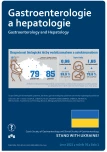-
Medical journals
- Career
Complicated course of Crohn’s disease of the small intestine in the patient in the eighth decade of life
Authors: Peterka- Š. 1 3
Authors‘ workplace: Interní oddělení, Nemocnice Jindřichův Hradec, a. s. 1; Klinické a výzkumné centrum pro idiopatické střevní záněty, Klinické centrum ISCARE a. s. a 1. LF UK v Praze 2; Oddělení gastroenterologie, Nemocnice České Budějovice, a. s. 3
Published in: Gastroent Hepatol 2022; 76(1): 30-33
Category:
doi: https://doi.org/10.48095/ccgh202230Overview
Crohn‘s disease (CD) comes within the group of idiopathic bowel diseases (IDP), together with ulcerative colitis (UC). Their common characteristic is that genetically predisposed individuals suffer from chronic digestive tract inflammation. In spite of almost 90 years of experience, CD remains an incurable disease. The clinical manifestation of the disease displays great heterogeneity. A discrepancy between the clinical picture and morphological finding in the digestive tract is one of the typical features of CD. Basic treatment consists of pharmacotherapy – conventional and/or biological – and surgery where needed. The aim is to achieve and maintain deep remission, limit the number of large-scale surgical interventions, and normalise the patients’ quality of life. The case history presents a female patient suffering from CD with extensive penetrating damage of the small intestine diagnosed in the eighth decade of her life. The patient’s case illustrates the difficulty of treating elderly patients, especially in the case of a severe form of Crohn’s disease.
Keywords:
Crohn’s disease – penetrating form – surgical treatment – exclusive enteral nutrition
Sources
1. Moran GW, Lim AW, Bailey JL et al. Review article: dermatological complications of immunosuppressive and anti-TNF therapy in inflammatory bowel disease. Aliment Pharmacol Ther 2013; 38 (9): 1002–1024. doi: 10.1111/apt.12491.
2. Hruz P, Juillerat P, Kullak-Ublick G et al. Management of the elderly inflammatory bowel disease patient. Digestion 2020; 101 (Suppl 1): 105–119. doi: 10.1159/000503099.
3. Lobatón T, Ferrante M, Rutgeerts P et al. Efficacy and safety of anti-TNF therapy in elderly patients with inflammatory bowel disease. Aliment Pharmacol Ther 2015; 42 (4): 441–451. doi: 10.1111/apt.13294. doi: 10.14735/amgh20 20148.
4. Drastich P. Vedolizumab v léčbě Crohnovy choroby ve světle nových poznatků. Gastroenterol Hepatol 2020; 74 (2): 148–153. doi: 10.14735/amgh2020148.
5. Lukáš M. Idiopatické střevní záněty: nové trendy a mezioborové souvislosti. Praha: Grada Publishing 2020 : 148–149.
6. Heerasing N, Thompson B, Hendy P et al. Exclusive enteral nutrition provides an effective bridge to safer interval elective surgery for adults with Crohn‘s disease. Aliment Pharmacol Ther 2017; 45 (5): 660–669. doi: 10.1111/apt.13 934.
7. Šerclová Z, Ryska O, Bortlík M et al. Doporučený postup chirurgické léčby pacientů s idiopatickými střevními záněty – 2. část: Crohnova nemoc. Gastroenterol Hepatol 2015; 69 (3): 223–238. doi: 10.14735/amgh2015223.
Labels
Paediatric gastroenterology Gastroenterology and hepatology Surgery
Article was published inGastroenterology and Hepatology

2022 Issue 1-
All articles in this issue
- Perspective year 2022
- Be optimistic!
- Kvíz z klinické praxe
- Doporučení Pracovní skupiny pro idiopatické střevní záněty pro diagnostiku a medikamentózní léčbu ulcerózní kolitidy
- Complicated course of Crohn’s disease of the small intestine in the patient in the eighth decade of life
- Point-of-care method for measuring infliximab and adalimumab trough levels in inflammatory bowel disease patients on biologic therapy
- Biosimilar treatment in paediatric gastroenterology – current view
- Safety of vedolizumab and ustekinumab in the treatment of pregnant women with inflammatory bowel disease – a multicentre retrospective-prospective observational study
- Remsima SC 120 mg – a new generation of biosimilar drugs
- The importance of home parenteral nutrition in clinical practice – own experience from our workplace
- Desmoid fibromatosis – a rare mesenteric tumor
- The selection from international journals
- Odešla mimořádná osobnost české gastroenterologie – Ivo Skála (17. 12. 1933 – 10. 2. 2022)
- Správná odpověď na kvíz
- Kreditovaný autodidaktický test: IBD
- Gastroenterology and Hepatology
- Journal archive
- Current issue
- Online only
- About the journal
Most read in this issue- Desmoid fibromatosis – a rare mesenteric tumor
- Remsima SC 120 mg – a new generation of biosimilar drugs
- The importance of home parenteral nutrition in clinical practice – own experience from our workplace
- Doporučení Pracovní skupiny pro idiopatické střevní záněty pro diagnostiku a medikamentózní léčbu ulcerózní kolitidy
Login#ADS_BOTTOM_SCRIPTS#Forgotten passwordEnter the email address that you registered with. We will send you instructions on how to set a new password.
- Career

